介子推与清明节英语故事
清明节英文介绍
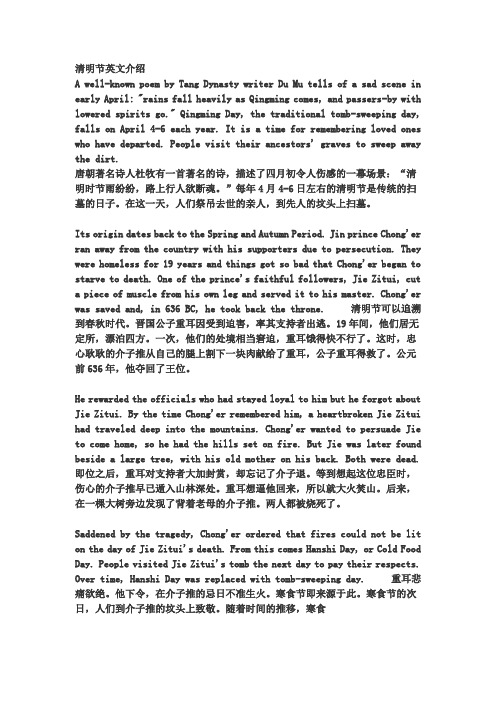
清明节英文介绍A well-known poem by Tang Dynasty writer Du Mu tells of a sad scene in early April: "rains fall heavily as Qingming comes, and passers-by with lowered spirits go." Qingming Day, the traditional tomb-sweeping day, falls on April 4-6 each year. It is a time for remembering loved ones who have departed. People visit their ancestors' graves to sweep awaythe dirt.唐朝著名诗人杜牧有一首著名的诗,描述了四月初令人伤感的一幕场景:“清明时节雨纷纷,路上行人欲断魂。
”每年4月4-6日左右的清明节是传统的扫墓的日子。
在这一天,人们祭吊去世的亲人,到先人的坟头上扫墓。
Its origin dates back to the Spring and Autumn Period. Jin prince Chong'erran away from the country with his supporters due to persecution. They were homeless for 19 years and things got so bad that Chong'er began to starve to death. One of the prince's faithful followers, Jie Zitui, cuta piece of muscle from his own leg and served it to his master. Chong'er was saved and, in 636 BC, he took back the throne. 清明节可以追溯到春秋时代。
清明节的习俗英文

清明节的习俗英文he rewarded the officials who had stayed loyal to him but he forgot about jie zitui. by the time chonger remembered him, a heartbroken jie zitui had traveled deep into the mountains. chonger wanted to persuade jie to come home, so he had the hills set on fire. but jie was later found beside a large tree, with his old mother on his back. both were dead. 即位之后,重耳对支持者大加封赏,却忘记了介子退。
等到想起这位忠臣时,伤心的介子推早已遁入山林深处。
重耳想逼他回来,所以就大火焚山。
后来,在一棵大树旁边发现了背着老母的介子推。
两人都被烧死了。
saddened by the tragedy, chonger ordered that fires could not be lit on the day of jie zituis death. from this comes hanshi day, or cold food day. people visited jie zituis tomb the next day to pay their respects. over time, hanshi day was replaced with tomb-sweeping day. 重耳悲痛欲绝。
他下令,在介子推的忌日不准生火。
寒食节即来源于此。
寒食节的次日,人们到介子推的坟头上致敬。
随着时间的推移,寒食tomb-sweeping day 清明节英文介绍tomb-sweeping day是最常用的pure bright festival 清明节另外的说法:qingming festival(清明节英语介绍)the qingming (pure brightness) festival is one of the 24 seasonal division points in china, falling on april 4-6 each year. after the festival, the temperature will rise up and rainfall increases. it is the high time for spring plowing and sowing. but the qingming festival is not only a seasonal point to guide farm work, it is more a festival ofcommemoration.the qingming festival sees a combination of sadness and happiness.this is the most important day of sacrifice. both the han and minority ethnic groups at this time offer sacrifices to their ancestors and sweep the tombs of the diseased. also, they will not cook on this day and only cold food is served.the hanshi (cold food) festival was usually one day before the qingming festival. as our ancestors often extended the day to the qingming, they were later combined.on each qingming festival, all cemeteries are crowded with people who came to sweep tombs and offer sacrifices. traffic on the way to the cemeteries becomes extremely jammed. the customs have been greatly simplified today. after slightly sweeping the tombs, people offer food, flowers and favorites of the dead, then burn incense and paper money and bow before the memorial tablet.in contrast to the sadness of the tomb sweepers, people also enjoy hope of spring on this day. the qingming festival is a time when the sun shines brightly, the trees and grass become green and nature is again lively. since ancient times, people have followed the custom of spring outings. at this time tourists are everywhere.people love to fly kites during the qingming festival. kite flying is actually not limited to the qingming festival. its uniqueness lies in that people fly kites not during the day, but also at night.a string of little lanterns tied onto the kite or the thread look like shining stars, and therefore, are called gods lanterns.the qingming festival is also a time to plant trees, for the survival rate of saplings is high and trees grow fast later. in the past, theqingming festival was called arbor day. but since 1979, arbor day was settled as march 12 according to the gregorian calendar.清明节清明是我国的二十四节气之一。
清明节的由来(中英文解说)
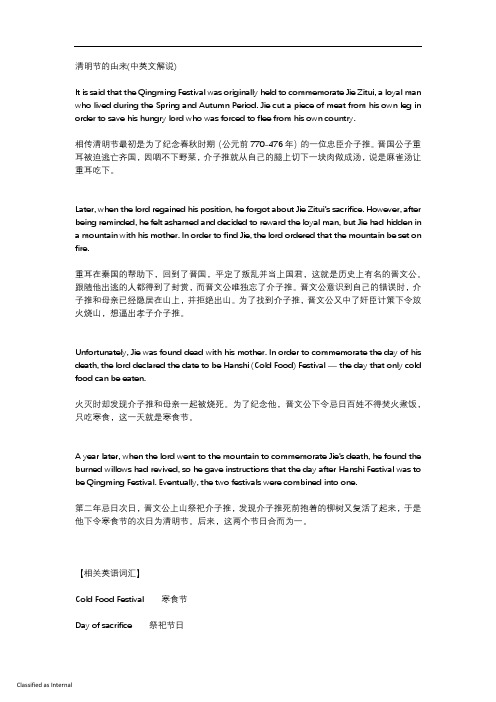
清明节的由来(中英文解说)It is said that the Qingming Festival was originally held to commemorate Jie Zitui, a loyal man who lived during the Spring and Autumn Period. Jie cut a piece of meat from his own leg in order to save his hungry lord who was forced to flee from his own country.相传清明节最初是为了纪念春秋时期(公元前770-476年)的一位忠臣介子推。
晋国公子重耳被迫逃亡齐国,因咽不下野菜,介子推就从自己的腿上切下一块肉做成汤,说是麻雀汤让重耳吃下。
Later, when the lord regained his position, he forgot about Jie Zitui’s sacrifice. However, after being reminded, he felt ashamed and decided to reward the loyal man, but Jie had hidden in a mountain with his mother. In order to find Jie, the lord ordered that the mountain be set on fire.重耳在秦国的帮助下,回到了晋国,平定了叛乱并当上国君,这就是历史上有名的晋文公。
跟随他出逃的人都得到了封赏,而晋文公唯独忘了介子推。
晋文公意识到自己的错误时,介子推和母亲已经隐居在山上,并拒绝出山。
为了找到介子推,晋文公又中了奸臣计策下令放火烧山,想逼出孝子介子推。
Unfortunately, Jie was found dead with his mother. In order to commemorate the day of his death, the lord declared the date to be Hanshi (Cold Food) Festival — the day that only cold food can be eaten.火灭时却发现介子推和母亲一起被烧死。
清明节的传说英语版
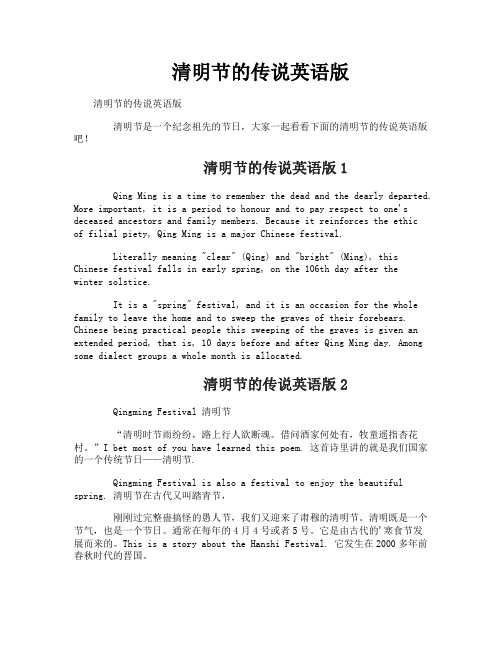
清明节的传说英语版清明节的传说英语版清明节是一个纪念祖先的节日,大家一起看看下面的清明节的传说英语版吧!清明节的传说英语版1Qing Ming is a time to remember the dead and the dearly departed. More important, it is a period to honour and to pay respect to one's deceased ancestors and family members. Because it reinforces the ethicof filial piety, Qing Ming is a major Chinese festival.Literally meaning "clear" (Qing) and "bright" (Ming), this Chinese festival falls in early spring, on the 106th day after thewinter solstice.It is a "spring" festival, and it is an occasion for the whole family to leave the home and to sweep the graves of their forebears. Chinese being practical people this sweeping of the graves is given an extended period, that is, 10 days before and after Qing Ming day. Among some dialect groups a whole month is allocated.清明节的传说英语版2Qingming Festival 清明节“清明时节雨纷纷,路上行人欲断魂。
关于清明节的由来英语作文8年级
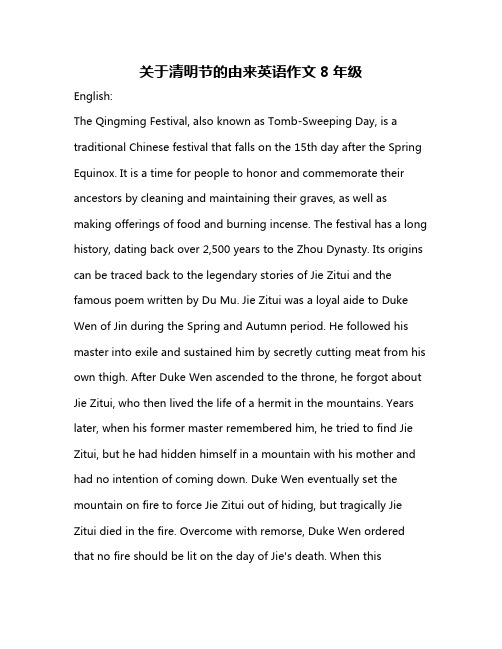
关于清明节的由来英语作文8年级English:The Qingming Festival, also known as Tomb-Sweeping Day, is a traditional Chinese festival that falls on the 15th day after the Spring Equinox. It is a time for people to honor and commemorate their ancestors by cleaning and maintaining their graves, as well as making offerings of food and burning incense. The festival has a long history, dating back over 2,500 years to the Zhou Dynasty. Its origins can be traced back to the legendary stories of Jie Zitui and the famous poem written by Du Mu. Jie Zitui was a loyal aide to Duke Wen of Jin during the Spring and Autumn period. He followed his master into exile and sustained him by secretly cutting meat from his own thigh. After Duke Wen ascended to the throne, he forgot about Jie Zitui, who then lived the life of a hermit in the mountains. Years later, when his former master remembered him, he tried to find Jie Zitui, but he had hidden himself in a mountain with his mother and had no intention of coming down. Duke Wen eventually set the mountain on fire to force Jie Zitui out of hiding, but tragically Jie Zitui died in the fire. Overcome with remorse, Duke Wen ordered that no fire should be lit on the day of Jie's death. When thishappened, he could not find Jie Zitui. Later he found his loyal aide and discovered that he and his mother were sustained only by wild vegetables. The Duke was so grieved by this and by Jie’s death that he ordered three days in his honor that no fire could be lit. This story eventually evolved into the Qingming Festival as we know it today.中文翻译:清明节,又称清明节,是中国的一个传统节日,是在春分后的第15天。
清明节的传说英语作文

清明节的传说英语作文English Response:The Qingming Festival, also known as the Tomb Sweeping Festival, is a traditional Chinese holiday that occurs annually on or around April 5th or 6th. It is a day when people visit the graves of their ancestors and pay respects to their departed loved ones. The festival has a long history, with its origins dating back more than 2,500 years.One of the most well-known legends associated with the Qingming Festival is the story of Jie Zitui. Jie Zitui wasa loyal follower of the Duke of Jin, Chong'er. During atime of exile, Chong'er and his followers were starving.Jie Zitui cut off a piece of his own thigh to feed his lord. When Chong'er eventually became king, he offered to reward Jie Zitui, but Jie refused and instead retreated to the mountains. In order to force Jie Zitui out of hiding,Chong'er ordered the mountains to be set on fire. However, Jie Zitui and his mother refused to leave the mountains andwere burned to death.In memory of Jie Zitui's sacrifice, Chong'er designated the day of their deaths as a day to sweep the tombs of ancestors and known as Qingming Festival. The festival was originally observed as a day of mourning, but over time it evolved into a day of family reunions and celebrations.Another legend associated with the Qingming Festival is the story of the Cold Food Festival. The Cold Food Festival is a three-day festival that occurs the week before the Qingming Festival. During the Cold Food Festival, people are not allowed to cook or eat hot food. This tradition is believed to have originated from a legend about a loyal minister named介子推(Jiè Zǐtuī).介子推(Jiè Zǐtuī) was a loyal follower of the Duke of Jin,Chong'er (重耳). When Chong'er was exiled from his kingdom, 介子推(Jiè Zǐtuī) followed him into exile and remained loyal to him throughout his many hardships.One day, when Chong'er and his followers were starving,介子推(Jiè Zǐtuī) cut off a piece of his own thigh to feed his lord. Chong'er was so moved by this act of loyalty that he vowed to reward 介子推(Jiè Zǐtuī) if he ever regained his kingdom.When Chong'er eventually regained his kingdom, heoffered to reward 介子推(Jiè Zǐtuī) with a highposition and a large fortune. However, 介子推(Jiè Zǐtuī) refused all of these rewards and instead asked to retire to the mountains.Chong'er was disappointed that 介子推(Jiè Zǐtuī)had refused his rewards, but he respected his wishes and allowed him to retire to the mountains. However, Chong'er never forgot the sacrifice that 介子推(Jiè Zǐtuī) had made for him.Every year, on the anniversary of the day that 介子推(Jiè Zǐtuī) cut off his thigh to feed Chong'er, Chong'er would order his people to not cook or eat hot food. Thisday became known as the Cold Food Festival.The Cold Food Festival is still observed in China today, and it is a reminder of the importance of loyalty and sacrifice.中文回答:清明节,又称扫墓节,是中国传统节日,每年公历4月5日或6日左右。
清明节故事英语作文80词
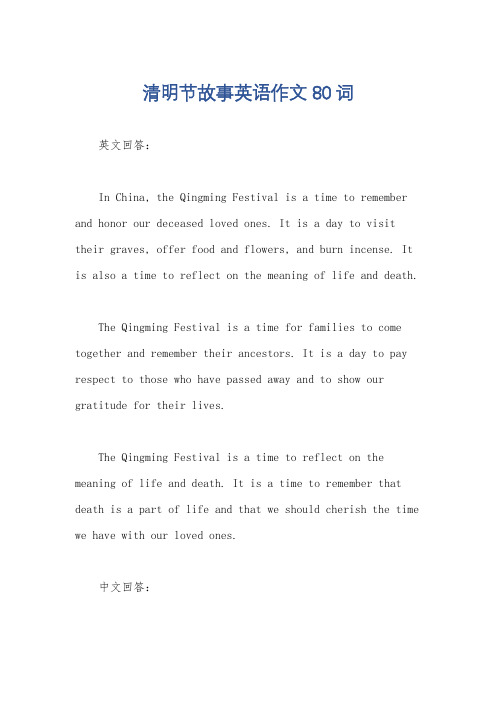
清明节故事英语作文80词英文回答:In China, the Qingming Festival is a time to remember and honor our deceased loved ones. It is a day to visit their graves, offer food and flowers, and burn incense. It is also a time to reflect on the meaning of life and death.The Qingming Festival is a time for families to come together and remember their ancestors. It is a day to pay respect to those who have passed away and to show our gratitude for their lives.The Qingming Festival is a time to reflect on the meaning of life and death. It is a time to remember that death is a part of life and that we should cherish the time we have with our loved ones.中文回答:清明节的故事。
清明节是中国重要的传统节日之一,也是一个祭奠逝者的节日。
在这天,人们会去扫墓,给故人献上鲜花和水果,并点燃香火。
清明节也是一个缅怀先人的日子,人们会通过各种方式来表达对逝者的思念和敬重。
清明节的由来。
清明节的起源可以追溯到两千多年前的春秋时期。
相传,当时晋国的大臣介子推跟随晋文公流亡在外,为了帮助文公复国,介子推割下自己大腿上的肉给文公充饥。
清明节起源作文英语带翻译
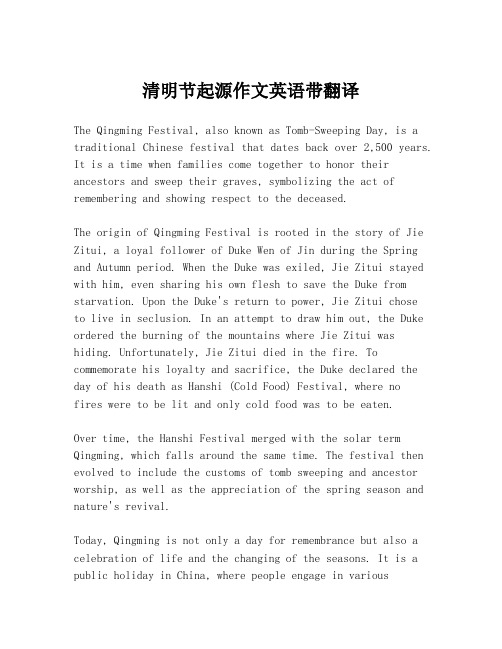
清明节起源作文英语带翻译The Qingming Festival, also known as Tomb-Sweeping Day, is a traditional Chinese festival that dates back over 2,500 years. It is a time when families come together to honor their ancestors and sweep their graves, symbolizing the act of remembering and showing respect to the deceased.The origin of Qingming Festival is rooted in the story of Jie Zitui, a loyal follower of Duke Wen of Jin during the Spring and Autumn period. When the Duke was exiled, Jie Zitui stayed with him, even sharing his own flesh to save the Duke from starvation. Upon the Duke's return to power, Jie Zitui choseto live in seclusion. In an attempt to draw him out, the Duke ordered the burning of the mountains where Jie Zitui was hiding. Unfortunately, Jie Zitui died in the fire. To commemorate his loyalty and sacrifice, the Duke declared the day of his death as Hanshi (Cold Food) Festival, where nofires were to be lit and only cold food was to be eaten.Over time, the Hanshi Festival merged with the solar term Qingming, which falls around the same time. The festival then evolved to include the customs of tomb sweeping and ancestor worship, as well as the appreciation of the spring season and nature's revival.Today, Qingming is not only a day for remembrance but also a celebration of life and the changing of the seasons. It is a public holiday in China, where people engage in variousactivities such as visiting cemeteries, offering food and drinks to the ancestors, and participating in cultural events.清明节的起源清明节,也被称为扫墓节,是一个有着2500多年历史的中国传统节日。
清明节的由来和意义英语作文
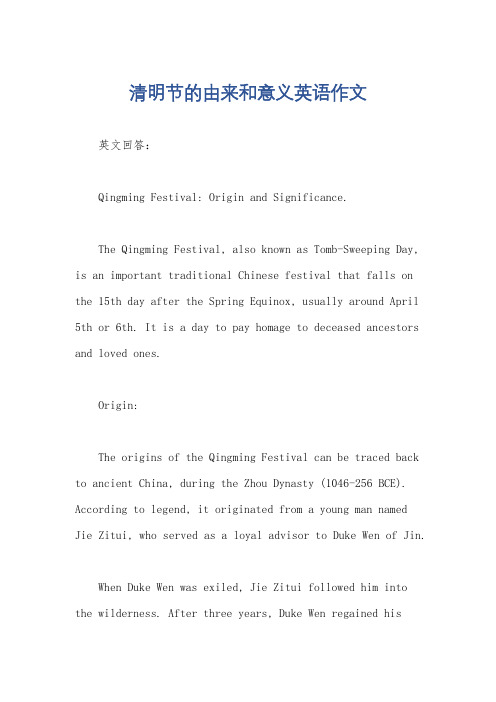
清明节的由来和意义英语作文英文回答:Qingming Festival: Origin and Significance.The Qingming Festival, also known as Tomb-Sweeping Day, is an important traditional Chinese festival that falls on the 15th day after the Spring Equinox, usually around April 5th or 6th. It is a day to pay homage to deceased ancestors and loved ones.Origin:The origins of the Qingming Festival can be traced back to ancient China, during the Zhou Dynasty (1046-256 BCE). According to legend, it originated from a young man namedJie Zitui, who served as a loyal advisor to Duke Wen of Jin.When Duke Wen was exiled, Jie Zitui followed him intothe wilderness. After three years, Duke Wen regained histhrone and rewarded his followers, but forgot about Jie Zitui. Jie Zitui was disappointed and retreated to the mountains with his mother.Duke Wen eventually realized his mistake and sent people to find Jie Zitui. However, Jie Zitui had set fire to the mountain in protest and perished in the flames. In memory of Jie Zitui, Duke Wen ordered his people to setfire to the mountains every year on the same day to commemorate his sacrifice.Over time, this practice evolved into the Qingming Festival, a day for people to visit the tombs of their ancestors, offer sacrifices, and remember the departed.Significance:The Qingming Festival holds great cultural andhistorical significance in China. It is a time for families to come together and honor their departed loved ones. It is also an occasion for people to reflect on the transience of life and the importance of cherishing relationships.Customs and Traditions:Tomb-Sweeping: The most important custom of the Qingming Festival is tomb-sweeping. People visit the graves of their ancestors and loved ones to clean them, offer food and flowers, and pay their respects.Kite-Flying: Kite-flying is a popular activity during the Qingming Festival. It is believed that kites carry messages to heaven and allow people to communicate with the departed.Eating Tomb Spirit Cakes: Tomb Spirit Cakes, also known as Qingming Cakes, are a traditional food eaten during the festival. They are made from glutinous riceflour and have various fillings, such as red bean paste or sesame seeds.Swinging on Willow Branches: Swinging on willow branches is another popular tradition associated with the Qingming Festival. It is believed to bring good luck andhealth.Modern Significance:While the Qingming Festival originated as a time to commemorate deceased ancestors, it has evolved into a broader cultural celebration that encompasses themes of remembrance, gratitude, and renewal. Today, it is a time for people to come together, honor their heritage, and reflect on the future.中文回答:清明节的由来和意义。
英语清明节作文带翻译

英语清明节作文带翻译英语清明节作文带翻译(精选10篇)在学习、工作、生活中,大家都写过作文吧,借助作文人们可以反映客观事物、表达思想感情、传递知识信息。
怎么写作文才能避免踩雷呢?下面是店铺为大家整理的英语清明节作文带翻译(精选10篇),仅供参考,希望能够帮助到大家。
英语清明节作文带翻译1ching Ming festival is a traditional chinese festival,has a history of two thousand five hundred years; Its main traditional cultural activities are: grave, outing, cockfighting, swing,play mat,pull hook,tug—of—war),etc。
The members (the grave),is very old。
Tomb—sweeping day,as a traditional culture, it is a full of mysterious colorific festival, on this day, the pedestrians on the road are missing people who died, to express their respect and grief!ching Ming festival,in hainan many locals call it the "qingming festival"。
Middle age the qingming festival is very important, if not as a legal holiday, they will also take time to go home "qingming festival"。
清明的由来英文版简短
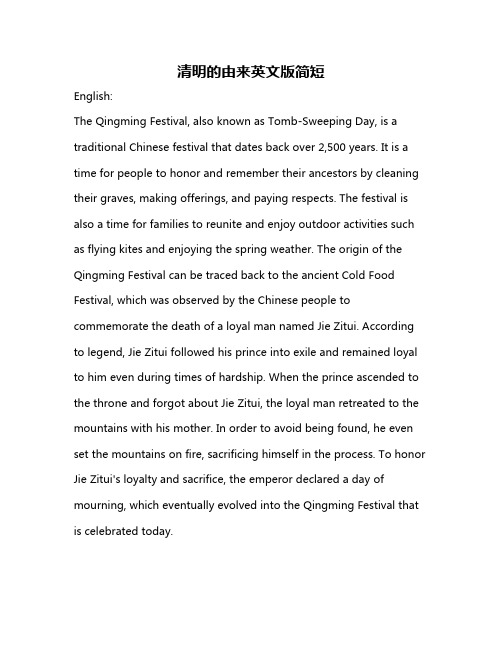
清明的由来英文版简短English:The Qingming Festival, also known as Tomb-Sweeping Day, is a traditional Chinese festival that dates back over 2,500 years. It is a time for people to honor and remember their ancestors by cleaning their graves, making offerings, and paying respects. The festival is also a time for families to reunite and enjoy outdoor activities such as flying kites and enjoying the spring weather. The origin of the Qingming Festival can be traced back to the ancient Cold Food Festival, which was observed by the Chinese people to commemorate the death of a loyal man named Jie Zitui. According to legend, Jie Zitui followed his prince into exile and remained loyal to him even during times of hardship. When the prince ascended to the throne and forgot about Jie Zitui, the loyal man retreated to the mountains with his mother. In order to avoid being found, he even set the mountains on fire, sacrificing himself in the process. To honor Jie Zitui's loyalty and sacrifice, the emperor declared a day of mourning, which eventually evolved into the Qingming Festival that is celebrated today.Translated content:清明节,又称为扫墓节,是中国的一个传统节日,可以追溯到2500多年前。
介子推与清明节英语故事_模板
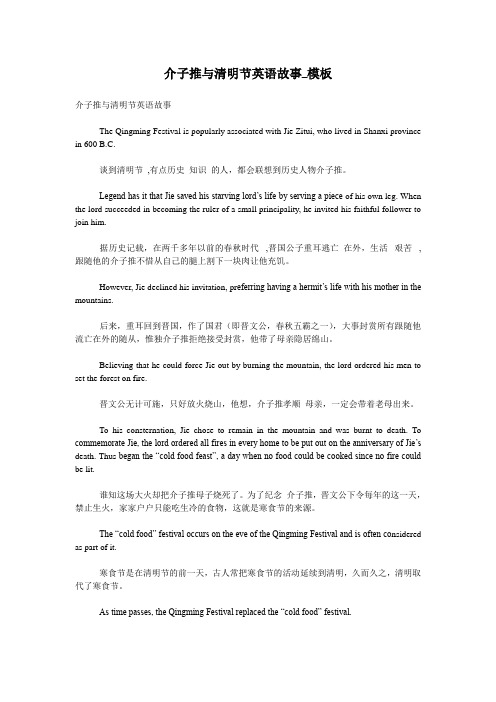
介子推与清明节英语故事_模板介子推与清明节英语故事The Qingming Festival is popularly associated with Jie Zitui, who lived in Shanxi province in 600 B.C.谈到清明节,有点历史知识的人,都会联想到历史人物介子推。
Legend has it that Jie saved his starving lord’s life by serving a piece of his own leg. When the lord succeeded in becoming the ruler of a small principality, he invited his faithful follower to join him.据历史记载,在两千多年以前的春秋时代,晋国公子重耳逃亡在外,生活艰苦,跟随他的介子推不惜从自己的腿上割下一块肉让他充饥。
However, Jie declined his invitation, pr eferring having a hermit’s life with his mother in the mountains.后来,重耳回到晋国,作了国君(即晋文公,春秋五霸之一),大事封赏所有跟随他流亡在外的随从,惟独介子推拒绝接受封赏,他带了母亲隐居绵山。
Believing that he could force Jie out by burning the mountain, the lord ordered his men to set the forest on fire.晋文公无计可施,只好放火烧山,他想,介子推孝顺母亲,一定会带着老母出来。
To his consternation, Jie chose to remain in the mountain and was burnt to death. To commemorate Jie, the lord ordered all fires in every home to be put out on the anniversary of Jie’s death. Thus began the “cold food feast”, a day when no food could be cooked since no fire could be lit.谁知这场大火却把介子推母子烧死了。
清明节的起源和习俗 英语作文
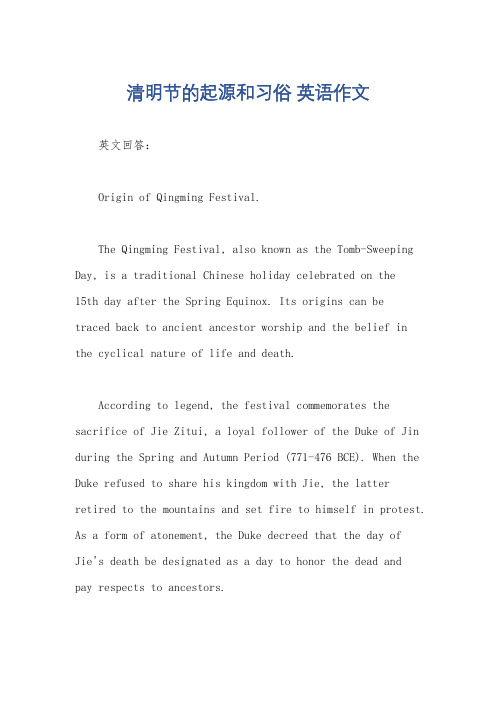
清明节的起源和习俗英语作文英文回答:Origin of Qingming Festival.The Qingming Festival, also known as the Tomb-Sweeping Day, is a traditional Chinese holiday celebrated on the15th day after the Spring Equinox. Its origins can betraced back to ancient ancestor worship and the belief in the cyclical nature of life and death.According to legend, the festival commemorates the sacrifice of Jie Zitui, a loyal follower of the Duke of Jin during the Spring and Autumn Period (771-476 BCE). When the Duke refused to share his kingdom with Jie, the latter retired to the mountains and set fire to himself in protest. As a form of atonement, the Duke decreed that the day ofJie's death be designated as a day to honor the dead andpay respects to ancestors.Customs of Qingming Festival.The Qingming Festival is observed with a variety of customs and traditions, including:Tomb-sweeping: Families visit the graves of their ancestors to clean them, offer flowers, burn incense, and pay their respects.Ancestor worship: People pay homage to their deceased family members through prayers, offerings of food and drink, and burning of paper money.Kite flying: Kites are believed to carry prayers and messages to heaven. Flying kites is a popular activity during the festival, especially for children.Eating Qingtuan: These glutinous rice balls filledwith sweet fillings are a traditional food associated with the festival.Visiting scenic places: Families often take advantageof the spring weather to go on outings to parks, gardens, and other natural areas.Significance of Qingming Festival.The Qingming Festival holds great significance in Chinese culture. It is a time to:Honor the dead and pay respects to ancestors.Commemorate the cyclical nature of life and death.Reflect on the past and prepare for the future.Celebrate the arrival of spring and the renewal of life.中文回答:清明节的起源。
关于清明节的故事由来英语作文

关于清明节的故事由来英语作文英文回答:In the depths of the Chinese cultural heritage,清明节(pronounced Qingming Jie) stands as a solemn festival marked by family reunions, tomb-sweeping, and the remembrance of ancestors. Its origins can be traced back to the Warring States period (475-221 BCE), a time ofpolitical turmoil and social upheaval.The legend associated with the festival revolves around a loyal subject named Jie Zhitui. During the turbulent period of the Qin dynasty (221-206 BCE), Jie Zhitui remained steadfast in his support of Duke Wen of Jin, who had been exiled from his kingdom. After Duke Wen's eventual return to power, he organized a feast to reward his followers. However, Jie Zhitui, known for his humility and selflessness, declined the invitation and retreated to Mount Mian.Determined to show his appreciation, Duke Wen orderedhis men to set fire to the mountain in an attempt to force Jie Zhitui to emerge. Tragically, Jie Zhitui and his mother perished in the blaze. Overcome with remorse, Duke Wen established a national day of mourning on the anniversaryof Jie Zhitui's death, which later became known as Qingming Jie.Over the centuries, Qingming Jie evolved into a timefor families to pay respects to their departed loved ones. People would visit ancestral tombs, sweep away fallenleaves and weeds, and offer food, wine, and joss sticks asa token of remembrance. The festival also became a time for families to gather, share stories, and honor their lineage.In modern China, Qingming Jie remains an important festival, although its customs have adapted with time.Tomb-sweeping is still a central practice, but people also engage in activities such as kite-flying, playing tug-of-war, and eating traditional Qingming snacks. The festival serves as a reminder of the importance of family, community, and the enduring legacy passed down through generations.中文回答:清明节起源于中国战国时期,相传晋文公重耳流亡国外,介子推忠心耿耿,割股充饥。
清明节背后的故事的英语作文

清明节背后的故事的英语作文英文回答:The Qingming Festival, also known as Tomb Sweeping Day, is a traditional Chinese holiday celebrated on the 15th day of the third month of the Chinese lunisolar calendar. It is a time for families to remember and honor their deceased loved ones by visiting their graves, cleaning their tombstones, and offering food and flowers.The Qingming Festival has a long history dating back to the Spring and Autumn Period (770-476 BC). According to legend, Jie Zhitui, a loyal subject of the Duke of Jin, was burned to death in a forest fire along with his mother. The Duke, remorseful over his death, decreed that the day of his death would be a day of mourning and remembrance.Over time, the Qingming Festival evolved into a timefor people to not only remember their deceased loved ones but also to appreciate the beauty of spring. It is a timefor families to get together, enjoy the outdoors, and participate in traditional activities such as kite flying, tomb sweeping, and playing tug-of-war.The Qingming Festival is a time for reflection and remembrance. It is a time to honor those who have passed away and to celebrate the beauty of life.中文回答:清明节,又称扫墓节,是中国传统节日,于农历三月十五日举行。
清明节神话故事英语作文
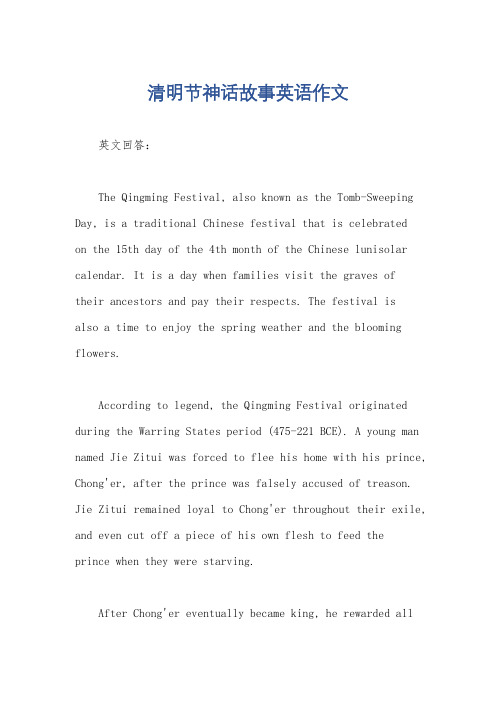
清明节神话故事英语作文英文回答:The Qingming Festival, also known as the Tomb-Sweeping Day, is a traditional Chinese festival that is celebratedon the 15th day of the 4th month of the Chinese lunisolar calendar. It is a day when families visit the graves oftheir ancestors and pay their respects. The festival isalso a time to enjoy the spring weather and the blooming flowers.According to legend, the Qingming Festival originated during the Warring States period (475-221 BCE). A young man named Jie Zitui was forced to flee his home with his prince, Chong'er, after the prince was falsely accused of treason. Jie Zitui remained loyal to Chong'er throughout their exile, and even cut off a piece of his own flesh to feed theprince when they were starving.After Chong'er eventually became king, he rewarded allof his followers, but forgot about Jie Zitui. Jie Zitui was so disappointed that he took his mother and went to live in seclusion on Mount Mian. When Chong'er realized his mistake, he sent people to find Jie Zitui, but they were unable to find him. In frustration, Chong'er set fire to the mountain in an attempt to force Jie Zitui out of hiding. However,Jie Zitui and his mother refused to leave the mountain and were burned to death.To commemorate Jie Zitui's loyalty, Chong'er designated the day of his death as the Qingming Festival. On this day, people are encouraged to visit the graves of theirancestors and pay their respects. They also offer food and wine to the spirits of the dead.The Qingming Festival is a time for families to remember their deceased loved ones and to honor their memory. It is also a time to enjoy the spring weather and the blooming flowers. The festival is a reminder of the importance of family and the value of loyalty.中文回答:清明节,又称扫墓节,是中国传统节日,在农历四月十五日举行。
清明节的起源——重耳公子和仆人介子推的故事
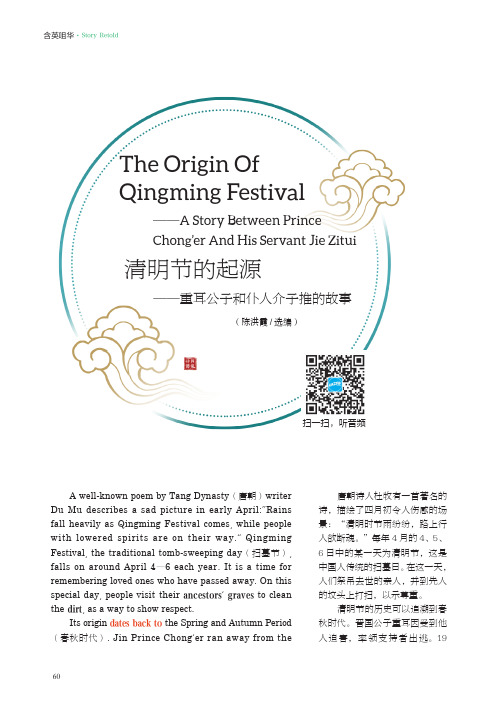
唐朝诗人杜牧有一首著名的诗,描绘了四月初令人伤感的场景:“清明时节雨纷纷,路上行人欲断魂。
”每年4月的4、5、6日中的某一天为清明节,这是中国人传统的扫墓日。
在这一天,人们祭吊去世的亲人,并到先人的坟头上打扫,以示尊重。
清明节的历史可以追溯到春秋时代。
晋国公子重耳因受到他人迫害,率领支持者出逃。
19A well-known poem by Tang Dynasty (唐朝)writerDu Mu describes a sad picture in early April:“Rains fall heavily as Qingming Festival comes, while people with lowered spirits are on their way.” Qingming Festival, the traditional tomb-sweeping day (扫墓节), falls on around April 4—6 each year. It is a time for remembering loved ones who have passed away. On this special day, people visit their ancestors ’ graves to clean the dirt , as a way to show respect.Its origin dates back to the Spring and Autumn Period(春秋时代). Jin Prince Chong’er ran away from the 含英咀华·Story RetoldThe Origin OfQingming Festival清明节的起源 ——重耳公子和仆人介子推的故事扫一扫,听音频——A Story Between PrinceChong’er And His Servant Jie Zitui(陈洪霞/选编)country with his supporters because of heavy persecution. They were homeless for 19 years and things got so bad that Chong’er was too weak to live. One of the prince’s loyal followers, Jie Zitui, cut a piece of muscle(肌肉)from his own leg and served it to his master. Chong’er was saved and, in 636 BC, he took back the throne.After Chong’er sit in the throne, he gave great prizes to supporters who had stayed loyal to him but he forgot about Jie Zitui. By the time Chong’er remembered him, the hopeless Jie Zitui had traveled deep into the mountains and didn’t want to come back. 年间,他们居无定所,处境相当窘迫。
清明节作文上的传说
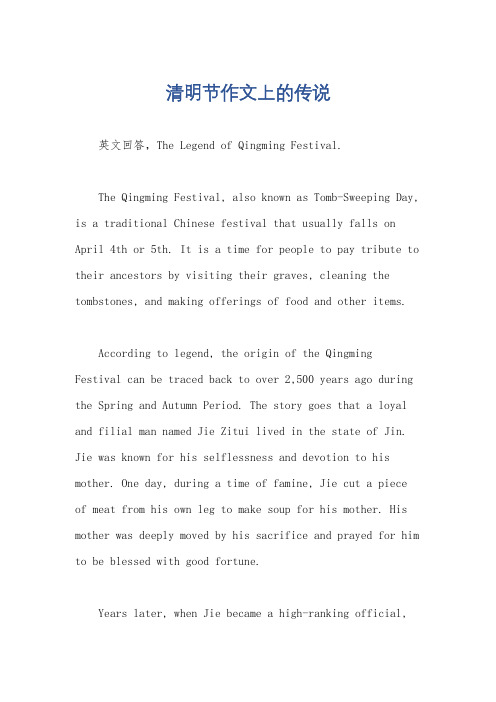
清明节作文上的传说英文回答,The Legend of Qingming Festival.The Qingming Festival, also known as Tomb-Sweeping Day, is a traditional Chinese festival that usually falls on April 4th or 5th. It is a time for people to pay tribute to their ancestors by visiting their graves, cleaning the tombstones, and making offerings of food and other items.According to legend, the origin of the QingmingFestival can be traced back to over 2,500 years ago during the Spring and Autumn Period. The story goes that a loyal and filial man named Jie Zitui lived in the state of Jin. Jie was known for his selflessness and devotion to his mother. One day, during a time of famine, Jie cut a piece of meat from his own leg to make soup for his mother. His mother was deeply moved by his sacrifice and prayed for him to be blessed with good fortune.Years later, when Jie became a high-ranking official,he was disappointed by the corruption and greed of the ruler. In protest, he resigned from his position and retreated to the mountains with his mother. They lived a simple and secluded life, surviving on wild plants and herbs.One day, the ruler realized his mistake and wanted to make amends with Jie. However, Jie, feeling betrayed, refused to meet with the ruler. In desperation, the ruler ordered a fire to be set in the mountains to force Jie out of hiding. Tragically, Jie and his mother were burned to death in the fire.Deeply remorseful, the ruler declared a day of mourning and ordered that no fire should be lit on that day. This day eventually became known as the Qingming Festival, a day to remember and honor Jie Zitui's loyalty and sacrifice.To this day, people still follow the tradition of paying respects to their ancestors during the Qingming Festival. They clean the graves, offer food and drinks, burn incense and paper money, and even participate inactivities like flying kites and playing traditional games.中文回答,清明节的传说。
介子推与清明节英语故事
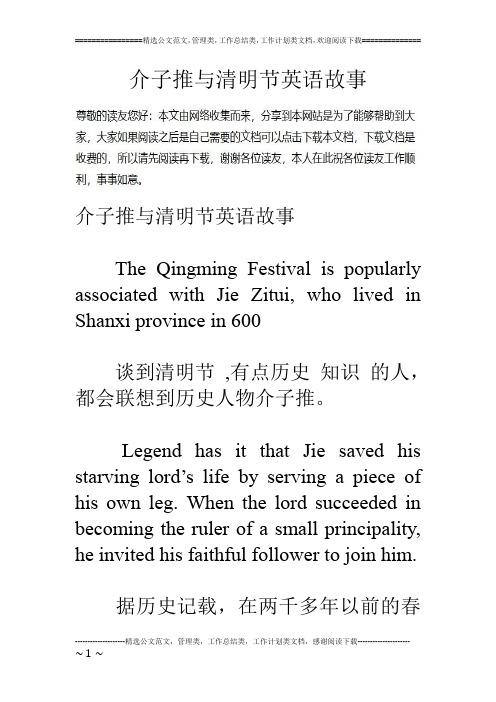
介子推与清明节英语故事介子推与清明节英语故事The Qingming Festival is popularly associated with Jie Zitui, who lived in Shanxi province in 600谈到清明节,有点历史知识的人,都会联想到历史人物介子推。
Legend has it that Jie saved his starving lord’s life by serving a piece of his own leg. When the lord succeeded in becoming the ruler of a small principality, he invited his faithful follower to join him.据历史记载,在两千多年以前的春秋时代,晋国公子重耳逃亡在外,生活艰苦,跟随他的介子推不惜从自己的腿上割下一块肉让他充饥。
However, Jie declined his invitation, preferri ng having a hermit’s life with his mother in the mountains.后来,重耳回到晋国,作了国君(即晋文公,春秋五霸之一),大事封赏所有跟随他流亡在外的随从,惟独介子推拒绝接受封赏,他带了母亲隐居绵山。
Believing that he could force Jie out by burning the mountain, the lord ordered his men to set the forest on fire.晋文公无计可施,只好放火烧山,他想,介子推孝顺母亲,一定会带着老母出来。
To his consternation, Jie chose toremain in the mountain and was burnt to death. To commemorate Jie, the lord ordered all fires in every home to be put out on the anniversary of Jie’s death. Thus began the “cold food feast”, a day when no food could be cooked since no fire could be lit.谁知这场大火却把介子推母子烧死了。
清明节ChingMingFestival

十多年後,重耳終於回國并當上了國 君,成了後來的晉文公,並一一犒賞曾協 助過他的人,卻將介子推遺忘了。經旁人 提醒後,晉文公才趕忙請介子推前來領賞, 誰知介子推已帶了他的母親到深山隱居了, 晉文公和臣子在山中尋了許久,仍遍尋不 著。
這時有人獻計放火燒山,認為介子 推是有名的孝子,一定會背著母親跑出 來。然而大火燒了很久,仍不見介子推 出現,等火熄滅了後,人們才發現介子 推背著他母親,已被燒死在一棵柳樹下。
晉文公見了後相當傷心懊悔,便將
這一天定為寒食節,規定人民禁止用火
一天,以紀念介子推的忠誠。
掃墓的步驟
掃墓可分三個步驟
修整墓園 祭祖 壓紙
掃墓的方式
「掛紙」
又叫「壓紙」, 就是替祖先修理房子的意思
象徵著子孫一年一度為祖先 的居處所添的新瓦 表示這座墳有子孫來祭掃
壓紙
掃墓的方式
「培墓」則是比較隆重的祭墓儀式 新墓要連續培墓三年, 而過去一年中有娶 媳婦 或生男丁的家庭也要培墓
據說這風俗是為了紀念「教民稼穡」 的農人祖師──神農氏。後來人們認為插 柳條能帶給他們長壽和平安。這個習俗 就留傳至今了。
清明節 杏花村
杜牧
清明時節雨紛紛 路上行人欲斷魂 借問酒家何處有 牧童搖指杏
感 恩
清明節的食俗
春捲,也稱為「潤餅 客家人則製作「艾粄」
墓粿
是祭掃墳墓用的粿類, 一般以紅龜粿、發粿及鼠麴粿為多。 現今人們已多用水果及鮮花替代了
墓粿
清明節的食俗
潤餅 又叫春捲
潤餅 是以麵粉做成薄皮,內可包
豆芽菜、紅蘿匐絲、筍絲及肉絲、 豆干絲及蛋皮等,灑上花生粉及糖 粉,捲成圓筒狀即可食用,相當可 口。
- 1、下载文档前请自行甄别文档内容的完整性,平台不提供额外的编辑、内容补充、找答案等附加服务。
- 2、"仅部分预览"的文档,不可在线预览部分如存在完整性等问题,可反馈申请退款(可完整预览的文档不适用该条件!)。
- 3、如文档侵犯您的权益,请联系客服反馈,我们会尽快为您处理(人工客服工作时间:9:00-18:30)。
介子推与清明节英语故事
介子推与清明节英语故事
The Qingming Festival is popularly associated with Jie Zitui, who lived in Shanxi province in 600
谈到清明节,有点历史知识的人,都会联想到历史人物介子推。
Legend has it that Jie saved his starving lord’s life by serving a piece of his own leg. When the lord succeeded in becoming the ruler of a small principality, he invited his faithful follower to join him.
据历史记载,在两千多年以前的春
秋时代,晋国公子重耳逃亡在外,生活艰苦,跟随他的介子推不惜从自己的腿上割下一块肉让他充饥。
However, Jie declined his invitation, preferri ng having a hermit’s life with his mother in the mountains.
后来,重耳回到晋国,作了国君(即晋文公,春秋五霸之一),大事封赏所有跟随他流亡在外的随从,惟独介子推拒绝接受封赏,他带了母亲隐居绵山。
Believing that he could force Jie out by burning the mountain, the lord ordered his men to set the forest on fire.
晋文公无计可施,只好放火烧山,他想,介子推孝顺母亲,一定会带着老母出来。
To his consternation, Jie chose to
remain in the mountain and was burnt to death. To commemorate Jie, the lord ordered all fires in every home to be put out on the anniversary of Jie’s death. Thus began the “cold food feast”, a day when no food could be cooked since no fire could be lit.
谁知这场大火却把介子推母子烧死了。
为了纪念介子推,晋文公下令每年的这一天,禁止生火,家家户户只能吃生冷的食物,这就是寒食节的来源。
The “cold food” festival occurs on the eve of the Qingming Festival and is often considered as part of it.
寒食节是在清明节的前一天,古人常把寒食节的活动延续到清明,久而久之,清明取代了寒食节。
As time passes, the Qingming
Festival replaced the “cold food” festival.
拜介子推的习俗也变成了清明扫墓的习俗了。
Whatever practice is observed,the basic observation of Qing Ming is to remember one’s elders by making a special effort to visit their graves, ashes or ancestral tablets. To make the visit even more meaningful, some time should be spent to let young generation of family members know ancestors’ past strugg les and contributions, and the story of Jie Zitui who chose death over capitulation.
无论以何种形式纪念,为了使纪念祖先的仪式更有意义,我们应该让年轻一代的家庭成员了解先人过去的奋斗历史,当然,还要学习介子推宁死不屈的气节。
